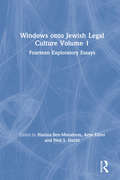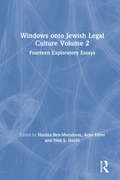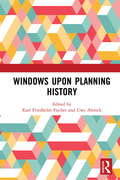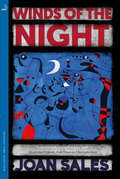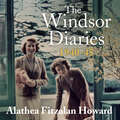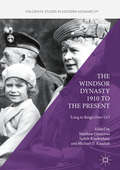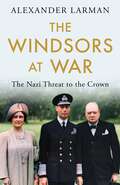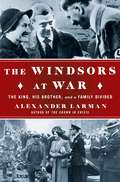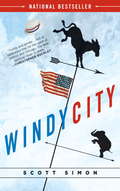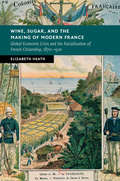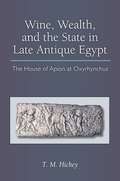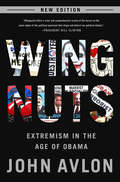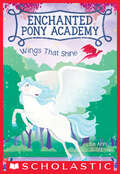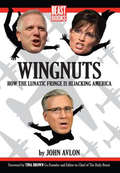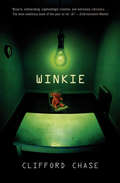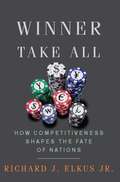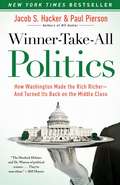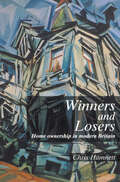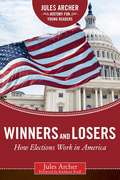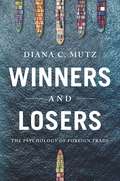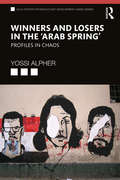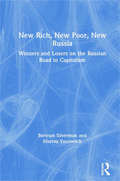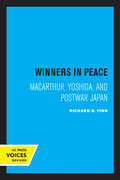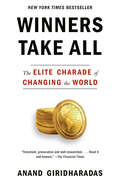- Table View
- List View
Windows onto Jewish Legal Culture Volume 1: Fourteen Exploratory Essays
by Hanina Ben-Menahem Arye Edrei Neil S. HechtThis book opens windows onto Jewish legal culture, by offering fourteen exploratory essays, each of which focuses on an aspect of Jewish law, broadly understood. Each chapter is a self-contained journey, as it were, into a feature of the Jewish legal landscape. In other words, rather than taking a structural approach, and attempting to neatly circumscribe and define ‘every’ element of Jewish law, Windows onto Jewish Legal Culture takes a dynamic and holistic approach, describing diverse manifestations of Jewish legal culture, without seeking to fit them into a single structure. Given this approach, readers have a number of options: they can focus on those chapters of particular interest to them; read the chapters in whatever order appeals to them; or go through the chapters in order. Reading even a handful of chapters should provide the reader with a good sense of the mind-set characteristic of Jewish legal thinking. Jewish legal culture spans two millennia, and evolved in geographic centers that were often very distant from one another both geographically and socio-culturally. It encompasses the Talmud and talmudic literature, the law codes, the rulings of rabbinical courts, the responsa literature, extra-judicial decisions taken by judges and communal leaders, study of the law in talmudic academies, the local study hall, and the home. But Jewish legal culture reaches well beyond legal and quasi-legal institutions; it addresses, and is reflected in, every aspect of daily life, from meals and attire to interpersonal and communal relations. The book gives the reader a taste of the tremendous weight of Jewish legal culture within Jewish life. Windows onto Jewish Legal Culture is divided into five sections. The opening section presents two distinguishing features of Jewish legal culture, namely, its toleration and even encouragement of controversy, and its preference for formalistic formulations. These features are often misunderstood, and been subjected to severe critique. Indeed, Jewish legal culture is often parodied as nit-picking, hair-splitting, argument for the sake of argument. Exploring Jewish legal culture’s partiality to controversy and formalism in its proper context, however, yields a very different picture. The second section, "Law and Ethics," gives readers a first-hand look at the way Jewish legal culture relates to three moral issues of importance to any society: equity, charity, and euthanasia. The third section focuses on the judicial process, a central topic in the general analysis of law, and even more so in Jewish law, where the judicial branch takes precedence over the legislative. The fourth section addresses questions pertaining to the role of the individual in the administration of justice—self help, and the individual’s obligation to defend himself and others against a pursuer. The closing section is devoted to private law, exploring the interface between Jewish legal culture and free market competition, unjust enrichment, agency, and labor law. This book will appeal to students at the advanced level, scholars, and interested laypeople; the primary target audience is academic. It is suitable for use as a textbook.
Windows onto Jewish Legal Culture Volume 2: Fourteen Exploratory Essays
by Hanina Ben-Menahem Arye Edrei Neil S. HechtThis book opens windows onto Jewish legal culture, by offering fourteen exploratory essays, each of which focuses on an aspect of Jewish law, broadly understood. Each chapter is a self-contained journey, as it were, into a feature of the Jewish legal landscape. In other words, rather than taking a structural approach, and attempting to neatly circumscribe and define ‘every’ element of Jewish law, Windows onto Jewish Legal Culture takes a dynamic and holistic approach, describing diverse manifestations of Jewish legal culture, without seeking to fit them into a single structure. Given this approach, readers have a number of options: they can focus on those chapters of particular interest to them; read the chapters in whatever order appeals to them; or go through the chapters in order. Reading even a handful of chapters should provide the reader with a good sense of the mind-set characteristic of Jewish legal thinking. Jewish legal culture spans two millennia, and evolved in geographic centers that were often very distant from one another both geographically and socio-culturally. It encompasses the Talmud and talmudic literature, the law codes, the rulings of rabbinical courts, the responsa literature, extra-judicial decisions taken by judges and communal leaders, study of the law in talmudic academies, the local study hall, and the home. But Jewish legal culture reaches well beyond legal and quasi-legal institutions; it addresses, and is reflected in, every aspect of daily life, from meals and attire to interpersonal and communal relations. The book gives the reader a taste of the tremendous weight of Jewish legal culture within Jewish life. Windows onto Jewish Legal Culture is divided into five sections. The opening section presents two distinguishing features of Jewish legal culture, namely, its toleration and even encouragement of controversy, and its preference for formalistic formulations. These features are often misunderstood, and been subjected to severe critique. Indeed, Jewish legal culture is often parodied as nit-picking, hair-splitting, argument for the sake of argument. Exploring Jewish legal culture’s partiality to controversy and formalism in its proper context, however, yields a very different picture. The second section, "Law and Ethics," gives readers a first-hand look at the way Jewish legal culture relates to three moral issues of importance to any society: equity, charity, and euthanasia. The third section focuses on the judicial process, a central topic in the general analysis of law, and even more so in Jewish law, where the judicial branch takes precedence over the legislative. The fourth section addresses questions pertaining to the role of the individual in the administration of justice—self help, and the individual’s obligation to defend himself and others against a pursuer. The closing section is devoted to private law, exploring the interface between Jewish legal culture and free market competition, unjust enrichment, agency, and labor law. This book will appeal to students at the advanced level, scholars, and interested laypeople; the primary target audience is academic. It is suitable for use as a textbook.
Windows Upon Planning History
by Karl Friedhelm Fischer Uwe AltrockWindows Upon Planning History delves into a wide range of perspectives on urbanism from Europe, Australia and the USA to investigate the effects of changing perceptions and different ways of seeing cities and urban regions. Fischer, Altrock and a team of 13 distinguished authors examine how and why the ideologies and the processes of city making changed in modern and post-modern times. Illustrated with over 45 images, the themes addressed in the book range from the changing outlook on Berlin’s historic apartment districts and their demolition, salvation and gentrification to how planning was deployed to support dictatorship; from the shattering of myths like democracies totally departing from preceding dictatorships to the model of the post-war modern city and its fate towards the end of the twentieth century. The volume combines case studies of cities on three continents with reflections on the historiography and the state of planning history. With a foreword by Stephen V. Ward, this book will appeal to a wide readership interested in the histories of planning, architecture and cities.
Winds of the Night (MacLehose Press Editions #8)
by Joan Sales"Perhaps the worst thing about war is the peace that follows . . ."Winds of the Night is the follow-up, published almost thirty years later, to Joan Sales' acclaimed masterwork of the Spanish Civil War, Uncertain Glory.It describes the shell-shocked wasteland that was post-war Catalonia through the eyes of Cruells, a Republican chaplain who survives the war, and completes his theological studies only to lose his faith in a world where it seems all hope has been extinguished.As he struggles to function as a rural priest, his steps are dogged by a ghostly figures from his past, such as Lamoneda, a fascist agent provocateur who now hobnobs with Himmler and misses few opportunities to turn the febrile post-war atmosphere to his financial advantage. Against his wishes, Creulls is drawn into obsessive dialogues about the war in which only lunacy prevails, for Lamoneda seems to hold the key to the whereabouts of an old friend - the mercurial Juli Soleràs, whose charisma, for all his betrayals, still holds Cruells in thrall.An essential coda to the modern classic that is Uncertain Glory, Winds of the Night is a Beckettian vision of the traumas of combatants and country hidden beneath the rhetoric of the victors.Translated from the Catalan by Peter Bush
The Windsor Diaries: A childhood with the young Princesses Elizabeth and Margaret
by Alathea Fitzalan HowardThe Windsor Diaries are the never-before-seen diaries of Alathea Fitzalan Howard, who lived alongside the young Princesses Elizabeth and Margaret at Windsor Castle during the Second World War. Alathea's home life was an unhappy one. Her parents had separated and so during the war she was sent to live with her grandfather, Viscount Fitzalan of Derwent, at Cumberland Lodge in Windsor Great Park. There Alathea found the affection and harmony she craved as she became a close friend of the two princesses, visiting them often at Windsor Castle, enjoying parties, balls, cinema evenings, picnics and celebrations with the Royal Family and other members of the Court.Alathea's diary became her constant companion during these years as day by day she recorded every intimate detail of life with the young Princesses, often with their governess Crawfie, or with the King and Queen. Written from the ages of sixteen to twenty-two, she captures the tight-knit, happy bonds between the Royal Family, as well as the aspirations and anxieties, sometimes extreme, of her own teenage mind. These unique diaries give us a bird's eye view of Royal wartime life with all of Alathea's honest, yet affectionate judgments and observations - as well as a candid and vivid portrait of the young Princess Elizabeth, known to Alathea as 'Lilibet', a warm, self-contained girl, already falling for her handsome prince Philip, and facing her ultimate destiny: the Crown.(P)2020 Hodder & Stoughton Limited
The Windsor Diaries: My Childhood with the Princesses Elizabeth and Margaret
by Alathea Fitzalan HowardThe never-before-published diaries of Alathea Fitzalan Howard—who spent her teenaged years living out World War II in Windsor Great Park with her close friends Princess Margaret and Princess Elizabeth, the future queen of the United Kingdom—provide an extraordinary and intimate look at the British Royal Family.Like so many others in Great Britain, young Alathea Fitzalan Howard&’s life was turned upside down by the start of the Second World War. Sent to stay with her grandfather at the historic Cumberland Lodge in Windsor Great Park, Alathea found the affection she so craved through her close friendship with the two princesses Elizabeth and Margaret, and their parents King George VI and Queen Elizabeth, her neighbors at nearby Windsor Castle. Together, the girls enjoyed parties, cinema evenings, picnics, and more, all recorded in honest and captivating detail in Alathea&’s diary, which she kept as a constant source of comfort. Day by day, from ages sixteen to twenty-two, she recorded the intimate details of her life with the Royal Family and the anxieties of wartime Britain. Now, published for the first time, these unique diaries unveil a candid and vivid portrait of the British Royal Family and of Princess Elizabeth in particular, the warm, quiet young girl who was already on her journey to her ultimate destiny: the Crown.
The Windsor Dynasty 1910 to the Present
by Matthew Glencross Judith Rowbotham Michael D. KandiahThis book explores the recreation and subsequent development of the British Monarchy during the twentieth century. Contributors examine the phenomenon of modern monarchy through an exploration of the establishment and the continuing impact of the Windsor dynasty both within Britain and the wider world, to interrogate the reasons for its survival into the twenty-first century. The successes (and failures) of the dynasty and the implications of these for its long-term survival are assessed from the perspectives of constitutional, political, diplomatic and socio-cultural history. Emphasis is placed on the use of symbols and tradition, and their reinvention, and public reactions to their employment by the Windsors, including the evidence provided by opinion polls. Starting with George V, and including darker times such as the challenge of the abdication of Edward VIII, this collection considers how far this reign was a key transition in how the British royal family has perceived itself and its role through examination of the repackaging for mass consumption via the media of a range of state occasions from coronations to funerals, as well as modernization of its relations with the military.
The Windsors at War: The Nazi Threat to the Crown
by Alexander LarmanAt the outbreak of WW2, the British monarchy was in a state of turmoil. The previous king, Edward VIII, had abdicated the throne, leaving his unprepared and terrified brother Bertie to become George VI. Meanwhile, as the now-Duke of Windsor awaited the decree that would allow him to marry his mistress Wallis Simpson, he took an increasing interest in the expansionist plans of the Führer of Germany. The Windsors at War tells the story of the turbulent and seismic decade in between 1937 and 1947, including the bombing of Buckingham Palace in May 1940, the Duke of Windsor's ill-advised visit to Germany in October 1937 and the death of the Duke of Kent in a plane crash in August 1942. It answers a simple question: how did this squabbling, dysfunctional family manage to put their differences aside and unite to help win the greatest conflict of their lifetimes?
The Windsors at War: The King, His Brother, and a Family Divided
by Alexander LarmanThe next volume in Alexander Larman's biographical chronicle of the Windsor family, as they go to war with Adolf Hitler—and each other.At the beginning of 1937, the British monarchy was in a state of turmoil. The previous king, Edward VIII, had abdicated the throne, leaving his unprepared and terrified brother Bertie to become George VI, surrounded by a gaggle of courtiers and politicians who barely thought him up to the job. Meanwhile, as the now-Duke of Windsor awaited the decree that would allow him to marry his mistress Wallis Simpson, he took an increased interest in the expansionist plans of Adolf Hitler. He may even have gone so far as to betray his country in the process. And as double agents and Nazi spies thronged the corridors of Buckingham Palace, the only man the King could trust was his Prime Minister, Winston Churchill. But they faced a formidable, even unbeatable, adversary: his own brother.The Windsors at War tells the never-before-told story of World War Two in Britain and America with a fresh focus on the royal family, their conflicted relationships, and the events that rocked the international press. How did this squabbling, dysfunctional family manage to put their differences aside and unite to help win the greatest conflict of their lifetimes? Alexander Larman, author of The Crown in Crisis, now chronicles the Windsor family at war with Germany—and each other.
Windy City: A Novel of Politics
by Scott Simon"Windy City" is funny and tender . . . full of boisterous love for the sport of politics and Chicago. The best political novel in years--Christopher Buckley, author of "Thank You for Smoking. "
Wine, Sugar, and the Making of Modern France: Global Economic Crisis and the Racialization of French Citizenship, 1870-1910
by Elizabeth HeathThis is an innovative study of how race and empire transformed French republican citizenship in the early Third Republic. Elizabeth Heath integrates the histories of the wine-producing department of Aude and the sugar-producing colony of Guadeloupe to reveal the ways in which empire was integral to the Third Republic's ability to stabilize a republican regime that began to unravel in an age of economic globalization. She shows how global economic factors shaped negotiations between local citizens and the Third Republic over the responsibilities of the Republic to its citizens leading to the creation of two different and unequal forms of citizenship that became constitutive of the interwar imperial nation-state and the French welfare state. Her findings shed important new light on the tensions within republicanism between ideals of liberty and equality and on the construction of race as a meaningful social category at a foundational moment in French history.
Wine, Wealth, and the State in Late Antique Egypt: The House of Apion at Oxyrhynchus
by Hickey T. M.The "glorious house" of the senatorial family of the Flavii Apiones is the best documented economic entity of the Roman Empire during the fifth through seventh centuries, that critical period of transition between the classical world and the Middle Ages. For decades, the rich but fragmentary manuscript evidence that this large agricultural estate left behind, preserved for 1,400 years by the desiccating sands of Egypt, has been central to arguments concerning the agrarian and fiscal history of Late Antiquity, including the rise of feudalism. Wine, Wealth, and the State in Late Antique Egypt is the most authoritative synthesis concerning the economy of the Apion estate to appear to date. T. M. Hickey examines the records of the family's wine production in the sixth century in order to shed light on ancient economic practices and economic theory, as well as on the wine industry and on estate management. Based on careful study of the original manuscripts, including unpublished documents from the estate archive, he presents controversial conclusions, much at odds with the "top down" models currently dominating the scholarship.
Wingnuts: Extremism in the Age of Obama
by John AvlonWingnuts exist on the extreme edges of the political spectrum. They’re the professional polarizers and the unhinged activists, the hardcore haters and the paranoid conspiracy theorists. They’re people who always try to divide us instead of unite us. And at a time when the fringe is blurring with the base, they’ve hijacked American politics.<P> The Obama era has been a boom-time for Wingnuts, kicked off by a financial collapse and the election America’s first black president. For some, losing an election feels like living under tyranny. John Avlon tracks down preachers who pray for the president’s death, goes inside the growing “Hatriot” militia movement, and identifies the fright-wing swamp where the Obama “Birthers” and the Bush-era “9/11 Truthers” bubble up.<P> Wingnuts echo earlier fear-fueled movements in American history. But bolstered by the rise of hyper-partisan media, the Wingnut echo chamber is more influential than ever before and it has led directly to the division and dysfunction in Congress. Avlon asserts that the time has come for the moderate majority of Americans to straighten their civic backbone and hold the extremes accountable while restoring a sense of perspective to our politics.
Wings That Shine (Enchanted Pony Academy #2)
by Lisa Ann ScottIn this fantasy tale, a magical pony must find the courage within herself to step forward and save her school.Welcome to the Enchanted Pony Academy, where glittery ponies learn how to use their magic!Skydancer can talk to any animal with wings—a very useful Glitter Gift, and one she’s always enjoyed (having your mane braided by birds is fun!).But when she stumbles upon a dragon at the edge of the Enchanted Pony Academy grounds, Skydancer is terrified. Can she be brave enough to use her Gift and convince the dragon to go away . . . before everything goes up in flames?
Wingsnuts
by John Avlon Tina BrownWhatOCOs a Wingnut? ItOCOs someone on the far-right wing or far-left wing of the political spectrum - the professional partisans and the unhinged activists, the hardcore haters and the paranoid conspiracy theorists. TheyOCOre the people who always try to divide us instead of unite us. "Wingnuts" looks at the outbreak of extremism in the opening years of the Obama administration OCo from the unprecedented government spending that spurred the Tea-Party protests to the onset of Obama Derangement Syndrome. John Avlon explains how hate-fueled rumors take hold (one section is called OC How Obama Became Hitler, a Communist and the AntichristOCO), looks at the OCyhunt for hereticsOCO that is taking place inside both parties and details the rise of hyper-partisan media. Avlon profiles preachers who are praying for the presidentOCOs death, goes inside the growing OC HatriotOCO movement and parallels the OC BirthersOCO and the OC 9/11 Truthers. OCO The book compares current merchants of political paranoia with past fear-mongers and finds that divisive demagogues have sold this snake oil before. But the two partiesOCO increased polarization and the echo-chamber of the internet are helping the fringe blur with the base, making the Wingnuts more powerful than ever before. We are allowing paranoids, hysterics and hyper-partisans to hijack our politics OCo but it doesnOCOt have to be this way. Avlon asserts that centrists need to stand up to the extremes on both sides and declare their independence. The book ends on a hopeful note OCo the conclusion is OC How to Take America Back from the Lunatic Fringe. OCO"
Winkie (Books That Changed the World)
by Clifford ChaseA teddy bear is arrested for terrorism in &“this surprisingly effective allegory of our terror-stricken times . . . a funny and sweet yet seriously topical novel&” (Kirkus, starred review). In Cliff Chase&’s scathingly funny debut novel, a mild-mannered teddy bear named Winkie comes to life—only to find himself on the wrong side of America&’s war on terror. After suffering decades of neglect from the children who once loved him, Winkie decides to take charge of his fate by hurling himself off the shelf, jumping out the window, and heading to the forest. But just as he discovers the joys of mobility, self-determination, and even true love, this small brown creature of indeterminate gender gets trapped in the jaws of a society gone rabid with fear and paranoia. Having come upon the cabin of the mad professor who stole his beloved, Winkie is suddenly surrounded by the FBI, who instantly conclude that he is the evil mastermind behind dozens of terrorist attacks. Terrified and confused, Winkie is brought to trial, where the prosecution attempts to seal the little bear&’s fate by calling upon witnesses from the trials of Galileo, Socrates, John Scopes, and Oscar Wilde. Winkie introduces the most memorable protagonist since the Velveteen Rabbit, and—with the help of a lesbian Muslim cleaning woman, a stuttering attorney, and a Lacan-spewing bear cub—exposes the cruel absurdities of our age while exploring what it means to be human.
Winner Take All: How Competitiveness Shapes the Fate of Nations
by Richard J. Elkus Jr.Over the past thirty years, the United States has lost commanding leads in business after business. We no longer make cameras, TVs, MP3 players, cell phones, or DVD players, and we have become the world's largest debtor nation. Everyone thinks this is because of cheap labor costs, but in fact Asian leaders have a fundamental and different way of thinking about business. They are playing a different game. If the U. S. wants to regain its competitiveness and preserve its global power, it must play the game as it's played in the rest of the world. Winner Take All tells us what it takes to be competitive, and how we need to reform our thinking to regain what we have lost. Richard Elkus isn't afraid to bring a few sacred cows to the slaughter. This is the essential primer for any policy maker, business leader, or general reader interested in knowing how America can regain the economic clout it once had.
Winner-Take-All Politics: How Washington Made the Rich Richer and Turned Its Back on the Middle Class
by Jacob S. Hacker Paul PiersonA groundbreaking work that identifies the real culprit behind one of the great economic crimes of our time-- the growing inequality of incomes between the vast majority of Americans and the richest of the rich. We all know that the very rich have gotten a lot richer these past few decades while most Americans haven't. In fact, the exorbitantly paid have continued to thrive during the current economic crisis, even as the rest of Americans have continued to fall behind. Why do the "haveit- alls" have so much more? And how have they managed to restructure the economy to reap the lion's share of the gains and shift the costs of their new economic playground downward, tearing new holes in the safety net and saddling all of us with increased debt and risk? Lots of so-called experts claim to have solved this great mystery, but no one has really gotten to the bottom of it--until now. In their lively and provocative Winner-Take-All Politics, renowned political scientists Jacob S. Hacker and Paul Pierson demonstrate convincingly that the usual suspects--foreign trade and financial globalization, technological changes in the workplace, increased education at the top--are largely innocent of the charges against them. Instead, they indict an unlikely suspect and take us on an entertaining tour of the mountain of evidence against the culprit. The guilty party is American politics. Runaway inequality and the present economic crisis reflect what government has done to aid the rich and what it has not done to safeguard the interests of the middle class. The winner-take-all economy is primarily a result of winner-take-all politics. In an innovative historical departure, Hacker and Pierson trace the rise of the winner-take-all economy back to the late 1970s when, under a Democratic president and a Democratic Congress, a major transformation of American politics occurred. With big business and conservative ideologues organizing themselves to undo the regulations and progressive tax policies that had helped ensure a fair distribution of economic rewards, deregulation got under way, taxes were cut for the wealthiest, and business decisively defeated labor in Washington. And this transformation continued under Reagan and the Bushes as well as under Clinton, with both parties catering to the interests of those at the very top. Hacker and Pierson's gripping narration of the epic battles waged during President Obama's first two years in office reveals an unpleasant but catalyzing truth: winner-take-all politics, while under challenge, is still very much with us. Winner-Take-All Politics--part revelatory history, part political analysis, part intellectual journey-- shows how a political system that traditionally has been responsive to the interests of the middle class has been hijacked by the superrich. In doing so, it not only changes how we think about American politics, but also points the way to rebuilding a democracy that serves the interests of the many rather than just those of the wealthy few.
Winners And Losers: Home Ownership In Modern Britain
by Chris HamnettFirst published in 1998. Routledge is an imprint of Taylor & Francis, an informa company.
Winners and Losers: How Elections Work in America (Jules Archer History for Young Readers)
by Kathleen Krull Jules ArcherWinners and Losers is a timeless exploration of a subject relevant to today's youth that will inspire young readers to get involved. Jules Archer shares the accessible and entertaining history of elections and political parties in America. He explores topics such as:Are political parties in America really different, or are affiliations based mostly on emotion and history?What does party loyalty mean? Should you vote for the candidate or the party?Do you have the right to participate in elections when you are under eighteen?Even young readers can do their part in elections. Being informed is the first step in taking part in choosing the leaders of tomorrow. Voting is a fundamental American right, and this book gives young people the tools necessary to be active participants in the process.
Winners and Losers: The Psychology of Foreign Trade (Princeton Studies in Political Behavior #27)
by Diana C. MutzFrom acclaimed political scientist Diana Mutz, a revealing look at why people's attitudes on trade differ from their own self-interestWinners and Losers challenges conventional wisdom about how American citizens form opinions on international trade. While dominant explanations in economics emphasize personal self-interest—and whether individuals gain or lose financially as a result of trade—this book takes a psychological approach, demonstrating how people view the complex world of international trade through the lens of interpersonal relations.Drawing on psychological theories of preference formation as well as original surveys and experiments, Diana Mutz finds that in contrast to the economic view of trade as cooperation for mutual benefit, many Americans view trade as a competition between the United States and other countries—a contest of us versus them. These people favor trade as long as they see Americans as the "winners" in these interactions, viewing trade as a way to establish dominance over foreign competitors. For others, trade is a means of maintaining more peaceful relations between countries. Just as individuals may exchange gifts to cement relationships, international trade is a tie that binds nations together in trust and cooperation.Winners and Losers reveals how people's orientations toward in-groups and out-groups play a central role in influencing how they think about trade with foreign countries, and shows how a better understanding of the psychological underpinnings of public opinion can lead to lasting economic and societal benefits.
Winners and Losers in the ‘Arab Spring’: Profiles in Chaos (UCLA Center for Middle East Development (CMED) series)
by Yossi (Joseph) AlpherThis book looks at the way primarily external actors influenced and were influenced by the revolutionary chaos that erupted in the Arab Middle East in 2011. The Arab revolutions radically altered the Middle East dynamic and particularly the strategic standing of key actors, both locally and globally. The ‘winners’ are leaders with strategic understanding of the region and a scheme for exploiting the chaos–Putin, Netanyahu and Iran’s Qasem Soleimani–along with, strikingly, the very institution of Arab monarchy. The ‘losers’ are the Arab autocrats who were deposed in Egypt, Libya and Yemen. The Palestinians, seemingly bypassed by the dynamic of Arab revolution, are also losers. So are the American presidents—Bush 43 and Obama—whose disastrous strategic decision-making catalyzed Arab state fragmentation and opened the gates of the Levant to Iran’s drive for regional hegemony. Western democratic society suffered too—from waves of Islamist terrorism and the effects of Muslim migration generated at least in part by Arab chaos. Only in the case of two leaders was the jury still out by 2019. The effects of the high-risk policies of Saudi Arabia’s crown prince Mohamed bin Salman and the strategically incoherent policies of US President Trump remain to be seen. Winners and Losers in the ‘Arab Spring’ takes a global look at a massive regional upheaval that is far from over. It is an essential read for everybody interested in the Arab revolutions, Middle East and international strategic affairs.
Winners and Losers on the Russian Road to Capitalism: Winners And Losers On The Russian Road To Capitalism
by Bertram Silverman Murray YanowitchAiming to explain many Russians' ambivalence to recent changes, this work examines the unequal distribution of the costs and benefits of reform, its impact on the socioeconomic structure of the population, and the ways in which these changes violate social perceptions of equity and fairness.
Winners in Peace: MacArthur, Yoshida, and Postwar Japan
by Richard B. FinnSingular for its breadth and balance, Winners in Peace chronicles the American Occupation of Japan, an episode that profoundly shaped the postwar world. Richard B. Finn, who participated in the Occupation as a young naval officer and diplomat, tells the full story of the activities from 1945 to 1952. He focuses on the two main actors, General Douglas MacArthur and Japanese Prime Minister Shigeru Yoshida, and details the era's major events, programs, and personalities, both American and Japanese. Finn draws on an impressive range of sources—American, Japanese, British, and Australian—including interviews with nearly one hundred participants in the Occupation. He describes the war crimes trials, constitutional reforms, and American efforts to rebuild Japan. The work of George Kennan in making political stability and economic recovery the top goals of the United States became critical in the face of the developing Cold War.Winners in Peace will aid our understanding of Japan today—its economic growth, its style of government, and the strong pacifist spirit of its people. This title is part of UC Press's Voices Revived program, which commemorates University of California Press’s mission to seek out and cultivate the brightest minds and give them voice, reach, and impact. Drawing on a backlist dating to 1893, Voices Revived makes high-quality, peer-reviewed scholarship accessible once again using print-on-demand technology. This title was originally published in 1992.
Winners Take All: The Elite Charade of Changing the World
by Anand GiridharadasAn insider's groundbreaking investigation of how the global elite's efforts to "change the world" preserve the status quo and obscure their role in causing the problems they later seek to solve. <P><P>Former New York Times columnist Anand Giridharadas takes us into the inner sanctums of a new gilded age, where the rich and powerful fight for equality and justice any way they can--except ways that threaten the social order and their position atop it. We see how they rebrand themselves as saviors of the poor; how they lavishly reward "thought leaders" who redefine "change" in winner-friendly ways; and how they constantly seek to do more good, but never less harm. We hear the limousine confessions of a celebrated foundation boss; witness an American president hem and haw about his plutocratic benefactors; and attend a cruise-ship conference where entrepreneurs celebrate their own self-interested magnanimity. <P><P>Giridharadas asks hard questions: Why, for example, should our gravest problems be solved by the unelected upper crust instead of the public institutions it erodes by lobbying and dodging taxes? He also points toward an answer: Rather than rely on scraps from the winners, we must take on the grueling democratic work of building more robust, egalitarian institutions and truly changing the world. A call to action for elites and everyday citizens alike. <P><b>A New York Times Bestseller</b>
